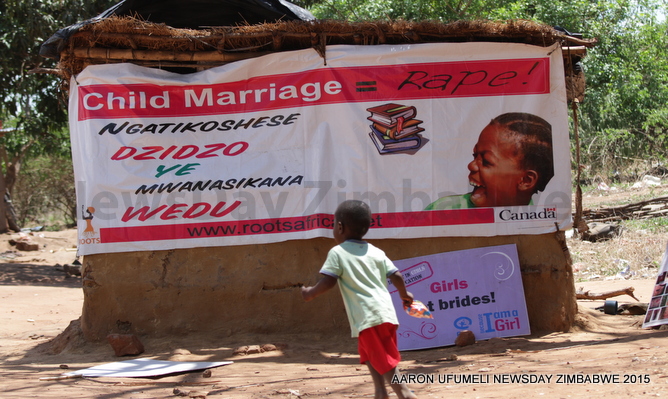
BY TAPIWA ZIVIRA
While the greatest fear for her agemates was the teacher’s reprimand for undone homework, young Stella’s biggest nightmare was the mountain of adult roles she was expected to perform to please her 30-something-year-old husband.

Stella was not alone. She joined thousands of other Zimbabwean girls in societies where girls are regarded as nothing other than objects for marriage.
She had been pushed into an early marriage.
Child marriage remains a problem not only in Zimbabwe, but the world over.
The trend, however, largely remains widespread in Mashonaland Central, where Stella’s hometown, Shamva, is.
According to the 2015 Unicef State of the World report, half of all child marriages recorded in Zimbabwe this year are from Mashonaland Central.
Unicef also estimates that one in every nine girls in Zimbabwe entered into marriage before the age of 15.
- Chamisa under fire over US$120K donation
- Mavhunga puts DeMbare into Chibuku quarterfinals
- Pension funds bet on Cabora Bassa oilfields
- Councils defy govt fire tender directive
Keep Reading
In societies where child marriages are rampant, girls, despite their enormous talent, never get a chance to prove their potential, as at a tender age, they find themselves being shown the bedroom instead of the classroom.
Writing in a newspaper column, Vaidah Mashangwa, Bulawayo’s provincial development officer in the Women Affairs, Gender and Community Development ministry, said child marriage is seen as an escape from poverty.
“While child marriage is viewed as a way to escape poverty, it actually worsens the cycle of intergenerational poverty as the poverty is passed on from one generation to the other,” she wrote.The result, according to health experts, is tragedies like stillbirths, pregnancy complications and maternal deaths.
A social worker told NewsDay the effects of abuse of children by marrying them off at a young age go beyond physical as child brides often end up suffering from depression, lack of self-confidence, isolation and anger, which may lead to excessive aggression and exhibition of anti-social behaviour, among many other things.
Although the law in Zimbabwe prohibits child marriages, a social worker within government indicated that it takes more than the law as society needs awareness on the matter.
“If society does not see it as breaking the law when a child is married off, no one will make a report to the police,” the social worker said.
Still on the law, Mashangwa pointed out the contradictions in the laws of the country on child marriages.
“One other cause of child marriage is weak laws and their inadequate implementation. In most countries, including Zimbabwe, there is no conviction in terms of breach of prohibitions against child marriage,” she wrote.In what points to the need to harmonise laws with the Constitution, the Marriages Act 5:11 contradicts with Section 81 of the Zimbabwe Constitution.
Section 81 of the Constitution states that children “under the age of 18 have a right to family or parental care . . . when removed from the family environment”, while Section 81 (1e) protects children from “economic and sexual exploitation, child labour and maltreatment, neglect or any form of abuse”.
However, the Marriage Act 5:11 states that “children under the age of 16 should marry with the consent of a guardian or a judge of the High Court in the absence of a guardian”, which means it gives room for child marriages.
With government failing to meet its budgetary obligations due to an underperforming economy, non-governmental organisations have stepped in with initiatives to minimise child marriages.
One of the organisations, Real Open Opportunities for Transformation Support (ROOTS), is working in Mashonaland Central, including Shamva, where Stella comes from.
For the past three months, ROOTS has been conducting open platform dialogue sessions with community members, traditional and political leaders to openly discuss, share notes and proffer solutions in curbing the problem of child marriages at community levels.
The idea, according to ROOTS director Beatrice Savadye, is to have communities develop customised methods of ending child marriages.
In addition to the awareness, ROOTS also addresses sexual and reproductive health needs of young girls and HIV prevention.
“Our programmes also target young girls, providing them with life skills to deal with poverty, one of the key drivers of child marriage,” Savadye said.For former child brides like Stella, a series of dialogue meetings, counselling and testing sessions have opened new doors for her. Her message: Children must be given an opportunity to attend school.
“It is only through school that a child can realise their full potential and it is from the depth of my heart that all the young girls I see here must attend school,” she says, with a face that exhibits a strong conviction to helping others avoid the abuse she went through.
One of the village heads actively involved in the push to end child marriages, Frank Garavato, said he was using his influence to preach the anti-child marriages message.
“Parents are not supposed to envy a man’s wealth and force their child to marry because of that. During our village meetings and other gatherings, we always put across the message,” Garavato said.
* Not her real name











